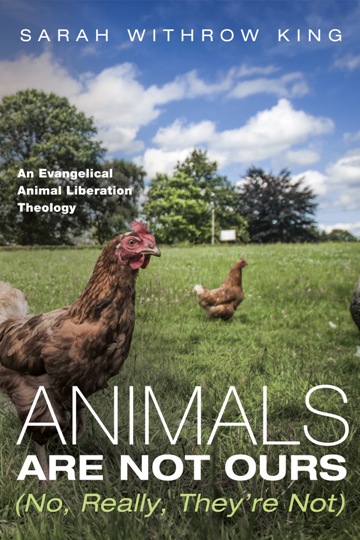Sarah Withrow King: Animals Are Not Ours (No, Really, They’re Not)
 Sarah Withrow King, Animals Are Not Ours (No, Really, They’re Not): An Evangelical Animal Liberation Theology (Cambridge: The Lutterworth Press, 2016), v + 184 pages.
Sarah Withrow King, Animals Are Not Ours (No, Really, They’re Not): An Evangelical Animal Liberation Theology (Cambridge: The Lutterworth Press, 2016), v + 184 pages.
According to the back cover, King is Deputy Director of the Sider Centre at Eastern University. She is just another Christian leader to add her voice in a growing choir supporting the animal liberation movement started by Dr. Andrew Linzey in 1976. This book is her attempt to help convince Evangelicals (i.e. those that believe the Bible and that Jesus is Lord and Savior who died and rose again to save us from our sins) to care about animals suffering and death as well as to provide advice for how to live out that care in practical terms.
The book is organized into three sections. Part 1, Looking at the Word through the Animal Lens, seeks to convince Evangelicals that our understanding of dominion and use of animals stems from a misreading of Scripture. Drawing heavily from the theologies of Andrew Linzey and Jürgen Moltmann (and others), King argues that humans should see our roles towards animals as servants and fellow creatures serving God. She asserts that God commanded a vegan diet (based on Genesis 2) and that our misunderstanding of dominion has led us to the mistaken belief that we can use violence against our fellow creatures, the animals.
In Part 2, Intersection and Bridges (The Oppression Connection), she turns to discuss more philosophical issues such as animal suffering (does it matter?), being human, hierarchy as a heresy, creation care, pro-life as including animals, and more. The goal of this section is simple. First, she wants to exploit our tendency to have compassion by emphasizing the myriad number of ways we cause animals to suffer. Second, she seeks to break down the notion that our status as humans gives us the right to harm and eat animals. Third, she argues for humans to be consistently non-violent both with each other and towards animals, our other neighbor.
With Parts 1 and 2 in hand, King turns to tell readers how to live out their new-found compassion in concrete terms. Part 3, Now What? The Basics of Treating Animals Well, provides a series of actions to help readers adopt a vegan diet and cruelty free lifestyle. King provides advice on how to start (begin with baby steps) and how to communicate with your non-vegan friends. She is both encouraging and gives specific, and frequently, absolutist directives on how followers should behave to achieve cruelty-free status.
This book is different from other food morality books I have read and/or reviewed in that King comes to the subject not as an intellectual but as a social change warrior. She actually worked for the shock-lobby group, People for the Ethical Treatment of Animals, otherwise known as PETA. I have no doubt that she is a true believer in the food morality movement. I can respect her for at least trying to integrate her faith in Christ with her ideology. Too many Christians live schizophrenic lives. I do not believe that she does and I think that says something positive about her character.
Category: Fall 2017, Living the Faith


